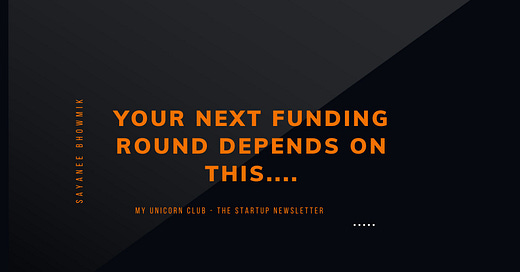Your next funding round depends on one thing…
When That Big Number Becomes Your Biggest Problem
Hey there,
Welcome to another edition of My Unicorn Club - The Startup Newsletter - It’s a biweekly FREE newsletter written by those on this side of the table (VCs & Investors) for those on that side (Founders & Startup Enthusiasts).
Let’s begin…..
I was grabbing coffee with a founder yesterday who was deciding between two term sheets - one at $8M, one at $12M.
"No-brainer, right? Take the bigger number?" he asked.
I had to be the buzzkill. Again.
We all get the appeal. You keep more of your company. Your competitor just raised at $10M, so surely you're worth at least that. Plus, big numbers make for great headlines.
But here's the thing - exciting valuation today can become your worst nightmare tomorrow. I've seen this movie too many times, and the ending isn't pretty.
During a recent founder brainstorming call, we calculated that raising at $12M versus $8M meant keeping an extra 5% of the company. Significant! But then we looked at what happens next.….
🚀 Founder Stories Wanted!
We are launching a podcast to feature startup founders and their journeys. If you’d like to share your story with 4,000+ listeners, let’s make it happen!
🎤 Apply here: https://shorturl.at/LIS1w
Here's what nobody tells you:
Down rounds are company killers. When your next round is at a lower valuation, it's like throwing ice water on your team. I watched a founder raise at $15M with barely $500K in revenue. A year later, they couldn't justify that number and had to take $7M. Half their team left within weeks.
Your valuation is basically a growth promise. Looking through my investor database, I see it clearly: raise at $10M when your metrics justify $5M, and you've just committed to growing at a pace that might require burning cash too quickly.
Exit options shrink dramatically. A founder I worked with last month realized their $12M valuation had eliminated most potential acquirers. They were stuck - too expensive for strategic buyers but not growing fast enough for another venture round.
So what works?
Base your valuation on real metrics, not wishful thinking. Revenue growth, customer retention - these create sustainable valuations.
Raise what you need for the next 18-24 months, not what your ego wants. Many founders I talk with are raising twice what they actually need.
Choose the right investor, not just the biggest check. During my 1:1 sessions reviewing my investor database, we focus on finding partners known for fair valuations and actually helping when things get tough.
Think two steps ahead. A founder I know recently took $7M instead of $9M because it gave her breathing room to hit realistic milestones. When the market cooled, she was still on track while competitors were struggling.
The best valuation isn't the highest one – it's the one you can build upon without unrealistic pressure.
What valuation pressures are you dealing with right now? Hit reply and let me know - I read every message and might even feature your situation (anonymously, of course) in the next newsletter.
Until next time, signing off
Sayanee Bhowmik
If you like reading My Unicorn Club - The Startup Newsletter - spread the word and share it with someone who might need it :)



